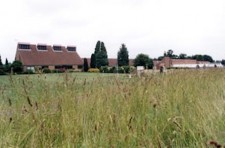 Scientists working at Rothamsted Research, a publicly-financed center in the U.K., began an agricultural study of bioengineered wheat about five years ago. The center which asserts that it is the longest running agricultural research station in the world tried to produce wheat that emitted an insect pheromone (hormone) which would repel aphids, an insect destructive to wheat. To do so, they borrowed a gene from mint plants known to program the production of the desired aphid-repellant pheromone.
Scientists working at Rothamsted Research, a publicly-financed center in the U.K., began an agricultural study of bioengineered wheat about five years ago. The center which asserts that it is the longest running agricultural research station in the world tried to produce wheat that emitted an insect pheromone (hormone) which would repel aphids, an insect destructive to wheat. To do so, they borrowed a gene from mint plants known to program the production of the desired aphid-repellant pheromone.
Lo and behold, the GM-wheat worked wonderfully in the lab testing situation. Unfortunately, the pheromone-producing grain failed to repel aphids in the field trials. Here s what the researchers had to say:
The use of genetic engineering to provide wheat able to produce the aphid alarm pheromone...was successful and robust this is a world first and an important proof of concept in plant science overall. GM wheat plants produced the pheromone in significant quantities without major unexpected changes seen in the appearance or performance of the new wheat plants, which looked and yielded as normal.
The scientists believe that the problem was in the timing or pattern of hormone release: in the wild, the chemical is released in pulses when needed to repel insect, while the GM-variety released its repellant continuously, and the aphids may have simply become acclimated to the constant lower levels present.
If successful, the GM-wheat would have allowed farmers to reduce insecticide spraying, benefiting the environment and making farming more sustainable. Moreover, there was no agribusiness giant involved: this was all done under the auspices of the UK government. Nevertheless, anti-GMO activists protested vigorously against the entire experiment. Protecting the field trials from activist vandals cost more than funding the actual science.
ACSH s medical director, Dr. Gil Ross, had this comment: What a sad state of affairs this is: while biotechnology will be crucial in helping to provide food for the next few billions of human beings to arrive on our planet over the next decades, these anti-GM zealots, analogous to the medieval shamans whose insights caused them to burn witches during periods of famine or flood, destroy experimental fields seeking only the truth. Then they turn around and accuse GMO researchers of not doing enough research! Amazing. A similar crusade in an experimental field of Golden Rice two years ago destroyed years of progress in that lifesaving area.
Wheat has been an especially fraught crop for biotech research, as the superstition against GMOs goes into higher gear when the topic is the staff of life, our daily bread as it were. The last project that our beloved, late-lamented founding trustee and Nobel Peace laureate, Norman Borlaug, was working on at the time of his death had to do with technological solutions to the severe, global problem of wheat rust, a fungal disease. This pilot project is a valuable first step in producing higher wheat yields, which will help prevent starvation in many regions of the earth if the environmentalists will permit it.


